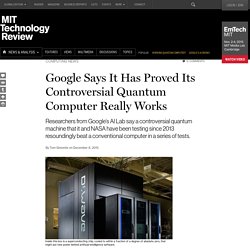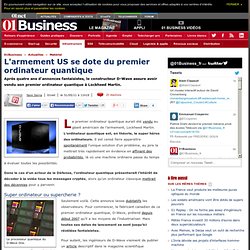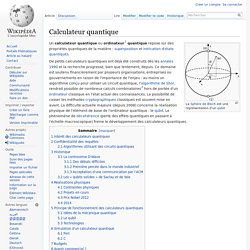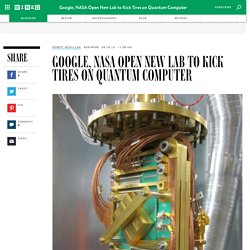

Controversial Quantum Machine Tested by NASA and Google Shows Promise. Inside this box is a superconducting chip, cooled to within a fraction of a degree of absolute zero, that might put new power behind artificial-intelligence software.

Google says it has proof that a controversial machine it bought in 2013 really can use quantum physics to work through a type of math that’s crucial to artificial intelligence much faster than a conventional computer. Governments and leading computing companies such as Microsoft, IBM, and Google are trying to develop what are called quantum computers because using the weirdness of quantum mechanics to represent data should unlock immense data-crunching powers. Computing giants believe quantum computers could make their artificial-intelligence software much more powerful and unlock scientific leaps in areas like materials science. How Quantum Computers and Machine Learning Will Revolutionize Big Data - Wired Science.
When subatomic particles smash together at the Large Hadron Collider in Switzerland, they create showers of new particles whose signatures are recorded by four detectors. The LHC captures 5 trillion bits of data — more information than all of the world’s libraries combined — every second. After the judicious application of filtering algorithms, more than 99 percent of those data are discarded, but the four experiments still produce a whopping 25 petabytes (25×1015 bytes) of data per year that must be stored and analyzed. That is a scale far beyond the computing resources of any single facility, so the LHC scientists rely on a vast computing grid of 160 data centers around the world, a distributed network that is capable of transferring as much as 10 gigabytes per second at peak performance. The LHC’s approach to its big data problem reflects just how dramatically the nature of computing has changed over the last decade.
Since Intel co-founder Gordon E. Memory and Movement. L'armement US se dote du premier ordinateur quantique. 01net le 31/05/11 à 11h19 Le premier ordinateur quantique aurait été vendu au géant américain de l’armement, Lockheed Martin.

L’ordinateur quantique est, en théorie, le super héros des ordinateurs. Il est censé faire apparaître spontanément l’unique solution d’un problème, au pire la mettrait très rapidement en évidence en affinant des probabilités, là où une machine ordinaire passe du temps à évaluer toutes les possibilités. Dans le cas d’un acteur de la Défense, l’ordinateur quantique présenterait l’intérêt de décoder à la volée tous les messages cryptés, alors qu’un ordinateur classique mettrait des décennies pour y parvenir.
Super ordinateur ou supercherie ? Quantum Computer Not Working? Grab Some Scotch Tape. Calculateur quantique. Un article de Wikipédia, l'encyclopédie libre.

Un calculateur quantique ou ordinateur[1] quantique repose sur des propriétés quantiques de la matière : superposition et intrication d'états quantiques. De petits calculateurs quantiques ont déjà été construits dès les années 1990 et la recherche progresse, bien que lentement, depuis. Ce domaine est soutenu financièrement par plusieurs organisations, entreprises ou gouvernements en raison de l'importance de l'enjeu : au moins un algorithme conçu pour utiliser un circuit quantique, l'algorithme de Shor, rendrait possible de nombreux calculs combinatoires[2] hors de portée d'un ordinateur classique en l'état actuel des connaissances. La possibilité de casser les méthodes cryptographiques classiques est souvent mise en avant.
La difficulté actuelle majeure (depuis 2008) concerne la réalisation physique de l'élément de base de l'ordinateur quantique : le qubit. Intérêt des calculateurs quantiques[modifier | modifier le code] Quantum design. Google, NASA Open New Lab to Kick Tires on Quantum Computer. If machines are going to become as smart as Google and NASA want them to be, they may need a whole new type of computing to get them there.

Quantum computing, that is. So today Google said it’s opening a lab — complete with a quantum computer — called the Quantum Artificial Intelligence Lab. It’s hosted at NASA’s Ames Research center, located just down the Highway 101 from Google’s Mountain View headquarters and run in conjunction with the Universities Space Research Association, a non-profit group devoted to space science. The lab will operate a 512-qubit quantum computer called the D-Wave Two, a machine that’s also being tested out by Lockheed Martin.
Google has had some success using its vast computing resources to build machine learning into services such as voice and image recognition, but this work is incredibly compute-intensive.